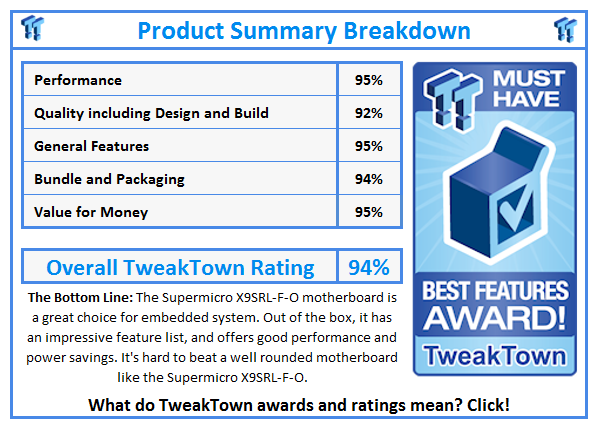Introduction and Packaging
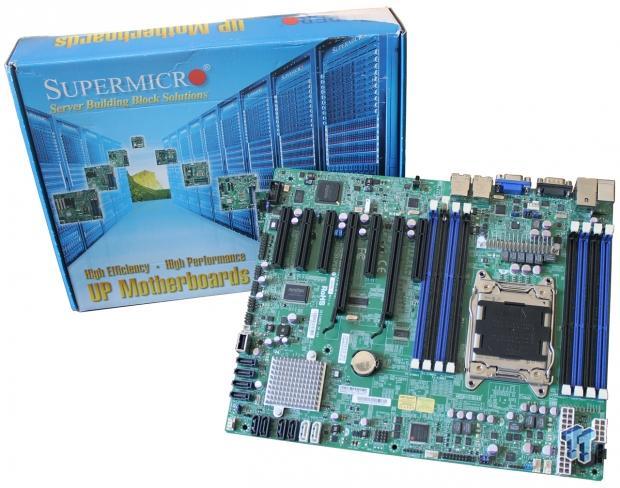
The Supermicro X9SRL-F-O motherboard comes in as a general purpose embedded motherboard that can fit into many different roles. It is ideal for database, application, enterprise server, SQL server, HPC, and VM workloads. It is designed around Intel Xeon E5-2600 CPU's, and is able to get a large number of cores into a small motherboard for better multi-threaded performance.
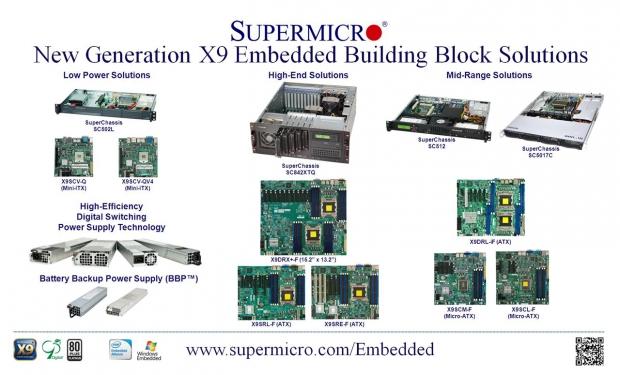
Here we are looking at Supermicro's X9 embedded solutions with the X9SRL-F-O motherboard right in the middle. It is able to fit into a wide array of server cases from 2U, 3U and 4U sizes, which gives you many options on how to setup this motherboard.
An impressive number of PCIe slots and storage options give the X9SRL-F-O plenty of flexibility for different system types. Let us look at what you get in a retail box, and then take the X9SRL-F-O through our tests to see how it performs.
Packaging
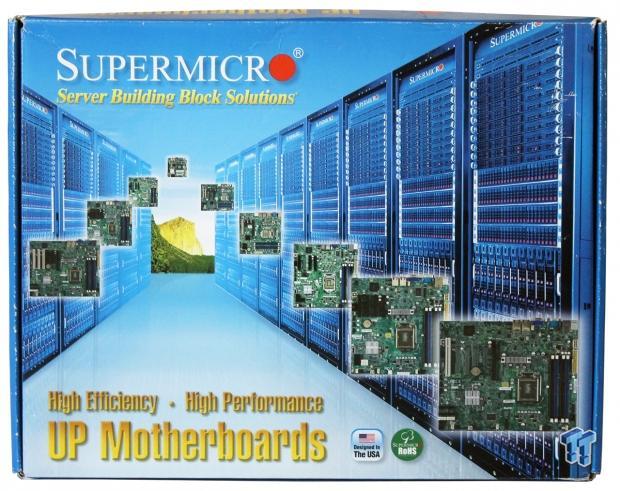
Here we look at the front of the retail box. This is a standard box that can fit many different motherboards with a sticker on the side that will say just what the motherboard inside is.
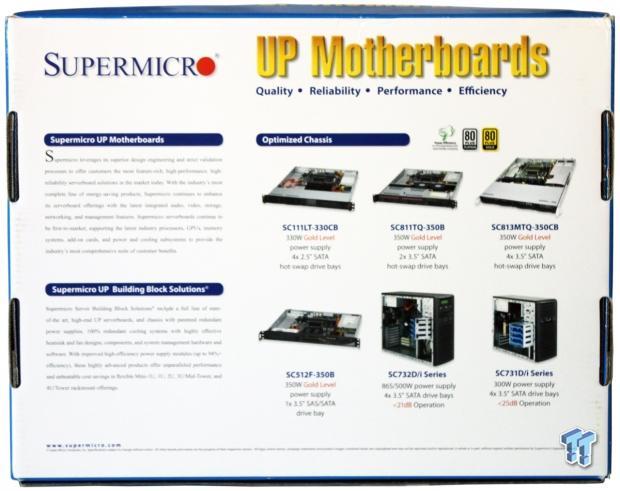
Now we see the back of the box, a generic box gives examples of several types of systems this motherboard can be used with.

The side of the box has a sticker that says what the motherboard inside is.
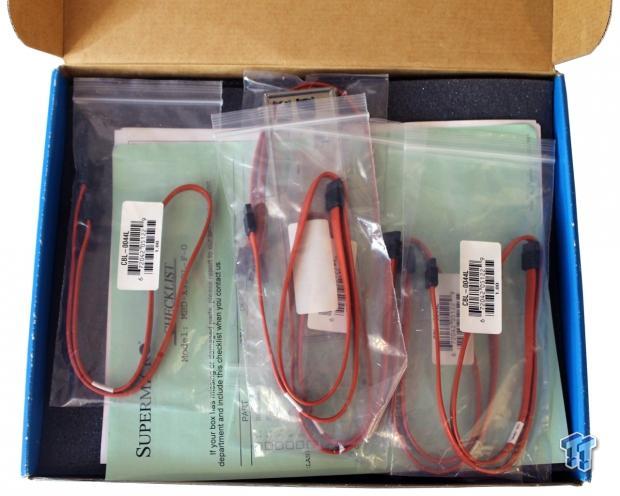
Opening the retail box, we can see the accessories on the top.
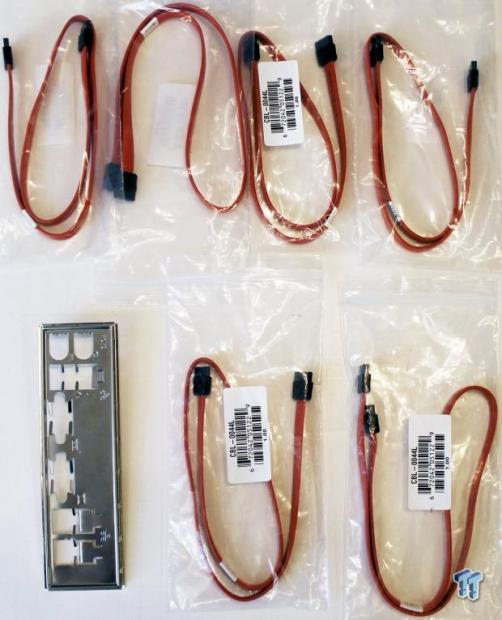
The parts list for the retail box is:
- 1x Motherboard X9SRL-F-O
- 6x SATA FLAT S-S PBF
- 1x I/O Shield MCP-260-00027-0N 1 STD
PRICING: You can find the Supermicro X9SRL-F-O for sale below. The prices listed are valid at the time of writing but can change at any time. Click the link to see the very latest pricing for the best deal.
United States: The Supermicro X9SRL-F-O retails for $271.49 at Amazon.
Canada: The Supermicro X9SRL-F-O retails for CDN$345.14 at Amazon Canada.
Specifications and Layout
Specifications
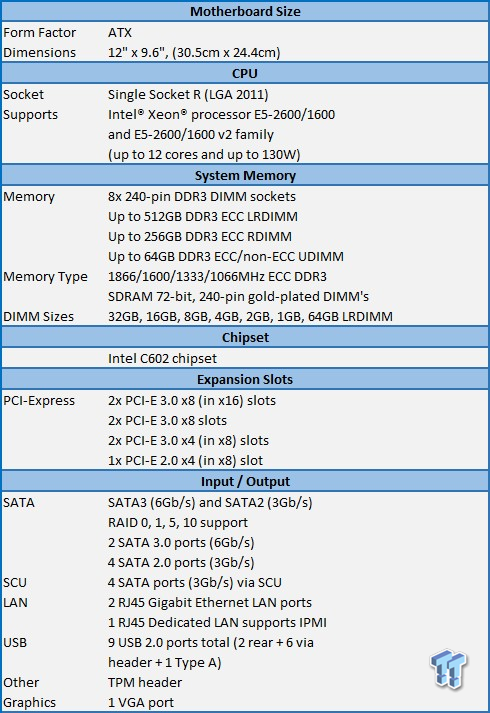
The main supporting features of this motherboard are its large number of SATA ports and PCIe slots, which give storage and RAID options right out of the box and plenty of expansion options.
The two LAN connections also supply basic network connectivity and provide the option to install faster network cards into the PCIe busses. The board also comes equipped with IPMI KVM as standard features.
Layout
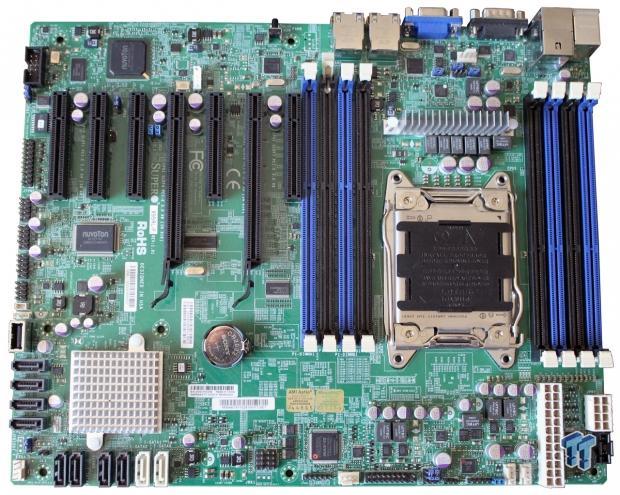
Here we get our first look at the Supermicro X9SRL-F-O.
With 7x PCIe slots (two physical x16 are PCIe 8x electrical slots) gives ample positions for cards like storage adapters or network cards. There is plenty of clearance behind the PCIe slots, there should not be any problems installing many different types of expansion cards.
The SATA connectors have good locations on the edges of the motherboard. There should be no issues routing SATA cables to drives in the front of a case.
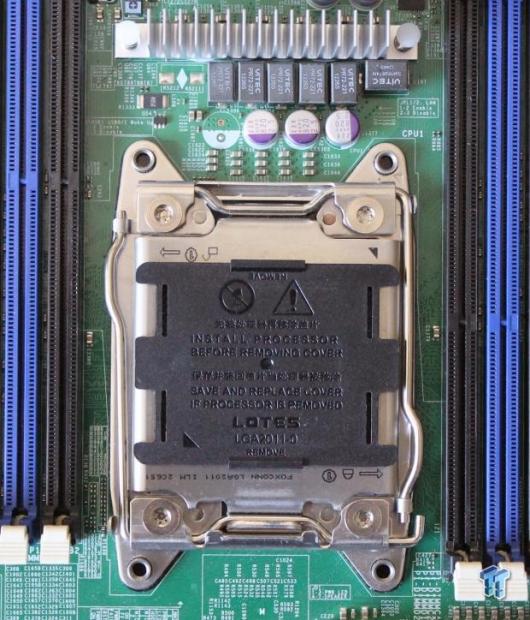
The X9SRL-F-O comes with a Socket LGA 2011-R that has the narrow mountings. This allows more space on the small motherboard. The area around the socket is nice and clean to allow for good airflow.
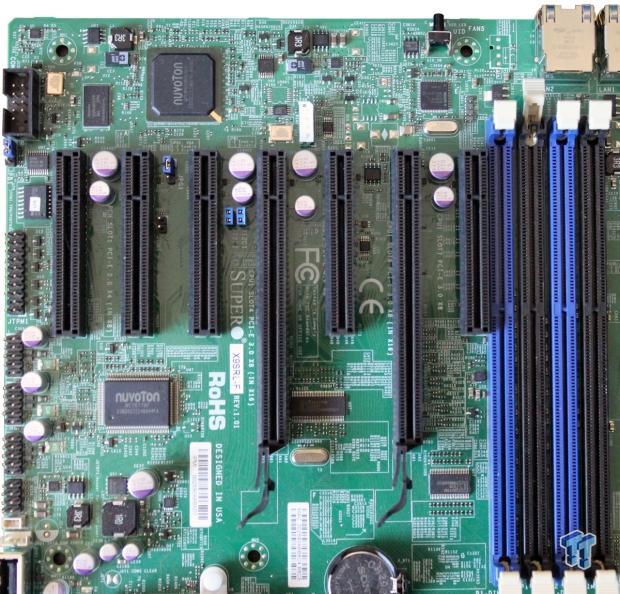
Here we see the 7x PCIe 3.0 slots, configured as below:
- Two (2) PCI-Express 3.0 x8 (in x16 Slot)
- Two (2) PCI-Express 3.0 x8 (in x8 Slot)
- Two (2) PCI-Express 3.0 x4 (in x8 Slot)
- One (1) PCI-Express 2.0 x4 (in x8 Slot)
On the left side of the motherboard starting at the top, we have:
- COM port
- IPMI/BMC enable jumper
- TPM Header
- 3x Internal USB Headers
- Serial Link general-purpose header
- Disk On Module Power Header
- Legacy Wake On LAN header
- Internal Type A USB port
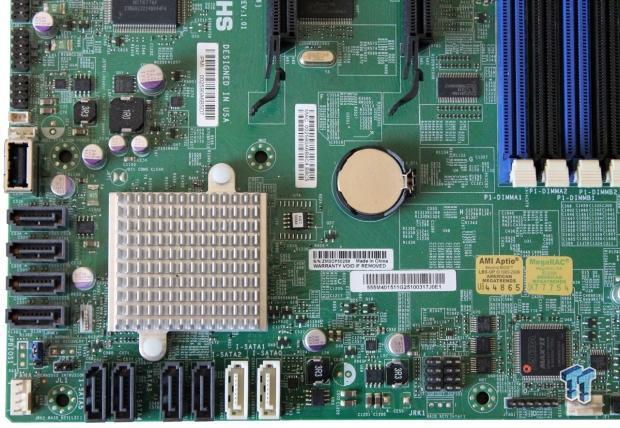
The bottom left side of the motherboard has the storage connections. Starting after the Type A USB connector of the left we have:
- Internal SATA ports 0-3 (3Gb/s, RAID 0,1,5,10) via SCU
- The blue jumper is ME Update
- Next to that is a black jumper for Chassis Intrusion
- The white header is Thermal fan header for I/O add-on cards
The next row of black SATA ports are Internal SATA ports 2-5 (3Gb/s) via PCH. The white SATA ports are Internal SATA ports 0-1 (6Gb/s) via PCH. Moving a little further on the bottom of the motherboard, we find:
- 2x Serial Link General Purpose I/O headers (5V Gen1/Gen2)
- Next is a JTAG header
- White System Thermal Fan header
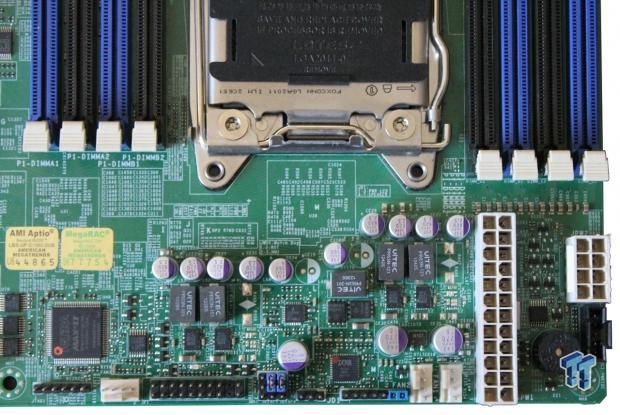
Right after the white fan header we find:
- Front Panel Header
- With the Blue jumpers is the Watch Dog Timer reset jumper
- Power LED, Speaker Header
- 2x White System Thermal Fan header
- 24-pin Main ATX Power Connector
- 8-pin Secondary Power Connector
- Power Supply SMBus 12C Header

Looking at the back IO ports now:
- PS/2 Mouse and Keyboard connector
- IPMI Network port with 2x USB ports
- COM Port
- VGA Port
- 2x LAN ports
BIOS, Software & Remote Management
BIOS
The BIOS for this motherboard is standard for server motherboards, so we will only show a few BIOS screens.
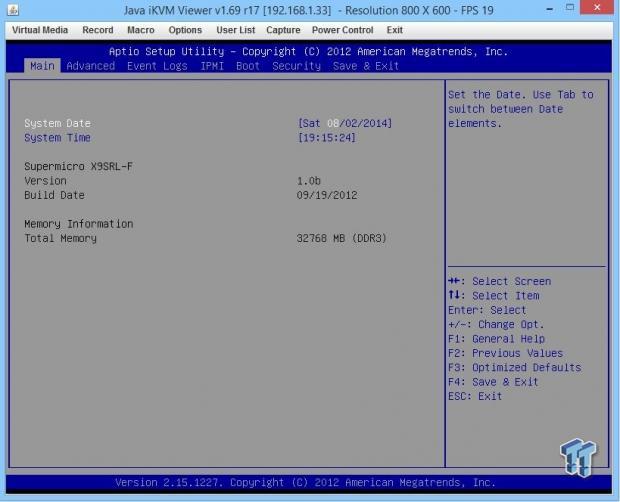
This is the main BIOS screen, which shows basic system information.
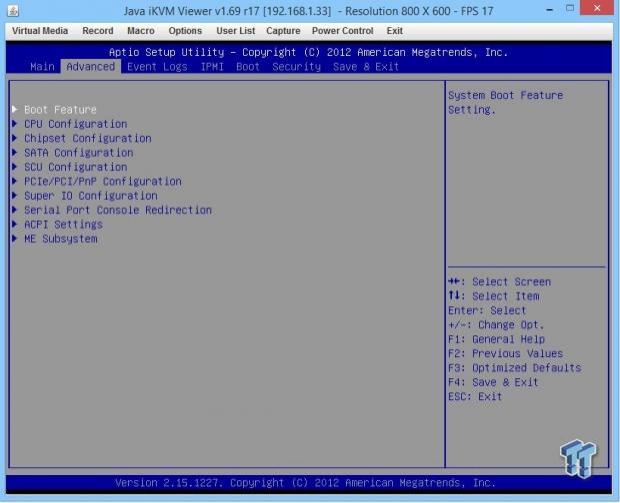
The advanced tab brings you to the main advanced screen.
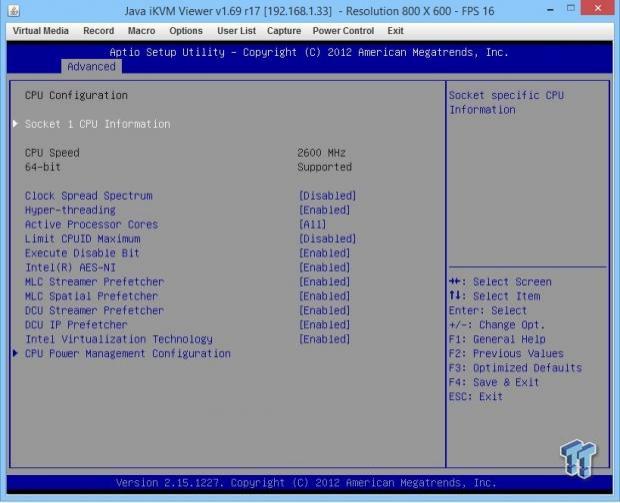
The advanced CPU tab shows the CPU options for this board.
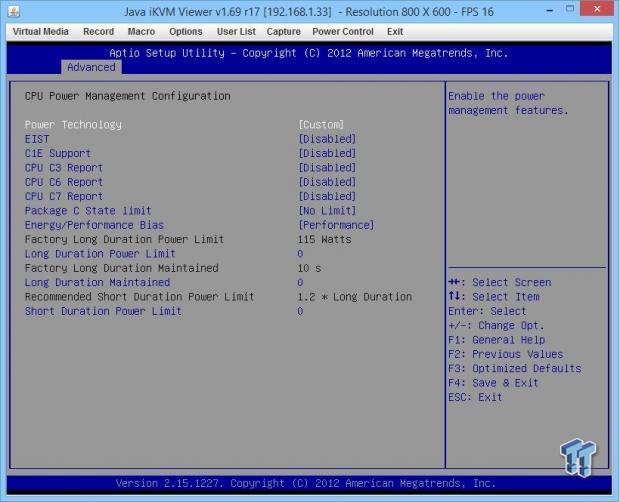
For our tests, we disable all power saving features.
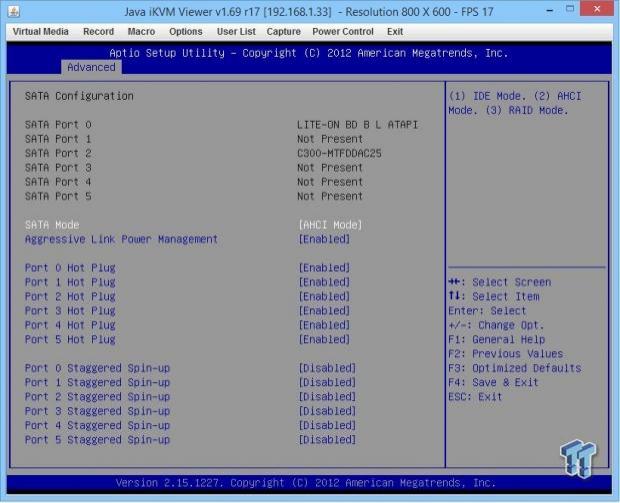
Looking at the SATA configuration tab, we can see the features that you can set on this motherboard.
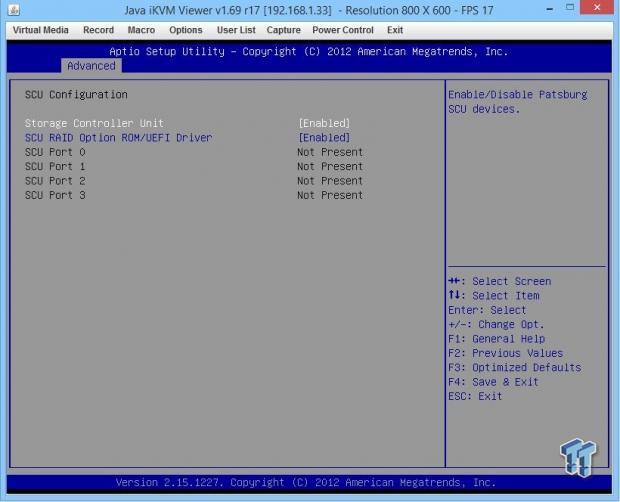
The SUC Configuration tab allows you to activate the onboard SAS storage control unit.
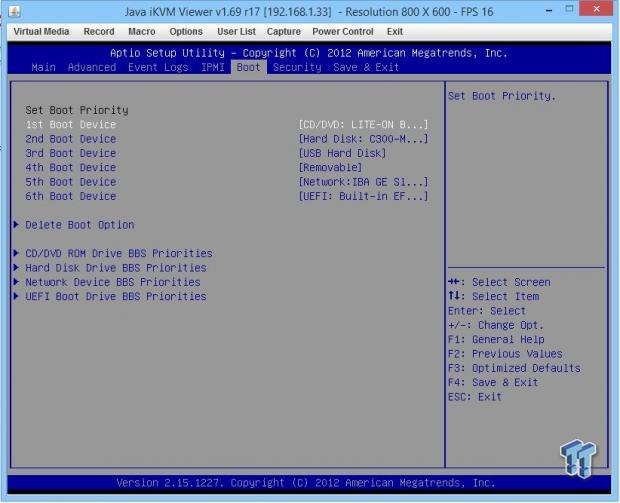
Here you can set the boot device and order for your system.
Software
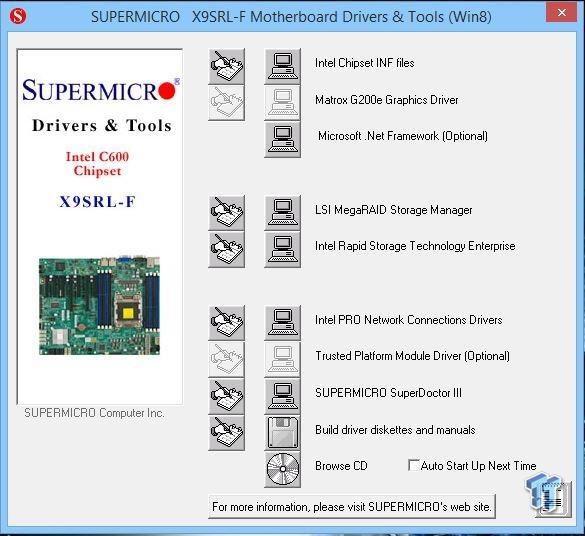
Our motherboard did not come with a driver disk. Over on the Supermicro website for this motherboard, you can find a link to a driver CD that you can download and burn to a CD.
We really like that Supermicro has included a full driver CD that we can download instead of different driver packages that we have to piece together ourselves.
Remote Management
Remote Access is supplied by IPMI 2.0 with virtual media over LAN and KVM over LAN support. Be sure to have a LAN cable plugged into the dedicated IPMI LAN port.

We find our remote access IP address located in the BIOS under the IPMI Tab. In our case, this was 192.182.1.36. Enter that into your browser and you will see the login screen.
As a best practice, administrative users should change factory default Username/Password logins before connecting any new server to their network.
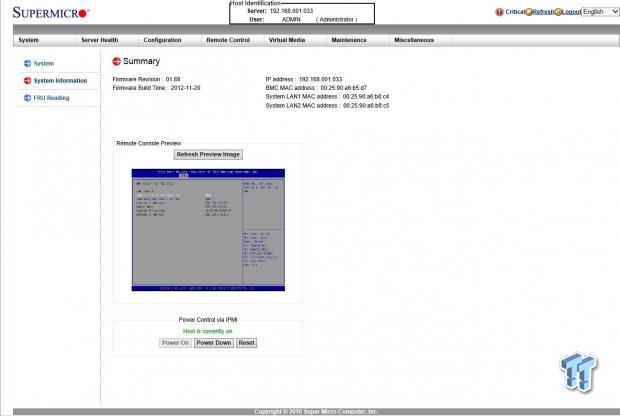
After logging in, we come to the home screen and system information is displayed.
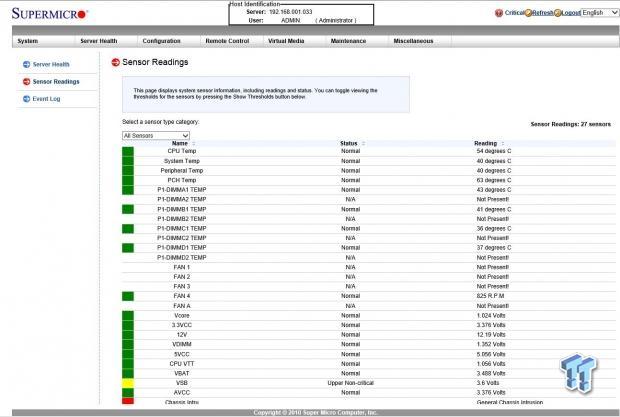
The next tab is Server Health. Here we can see sensor readings and event logs.
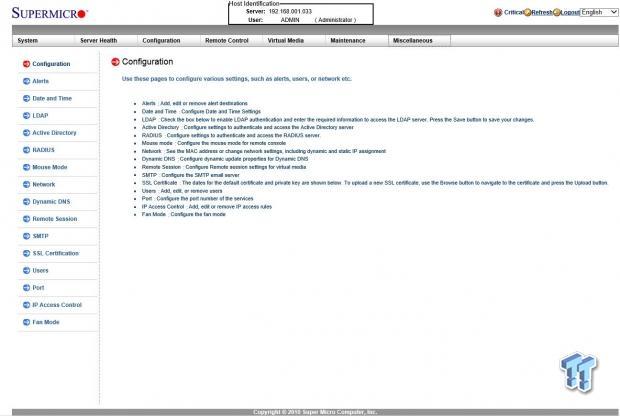
Next up is the Configuration tab.
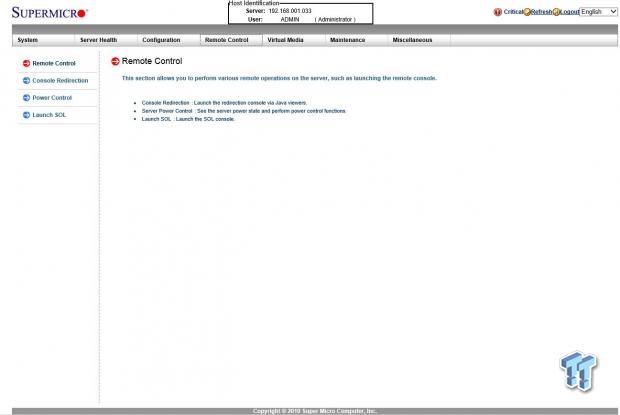
Under the Remote Control tab, we can launch the remote KVM console and get access to the machine. This will launch a java console and then take you into the remote access screen just as if you are sitting down at the machine itself.
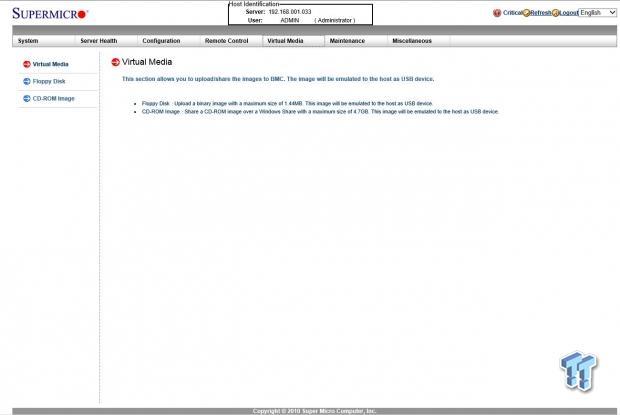
Now we are looking at the Virtual Media Tab. This section allows you to upload/share images to the BMC.
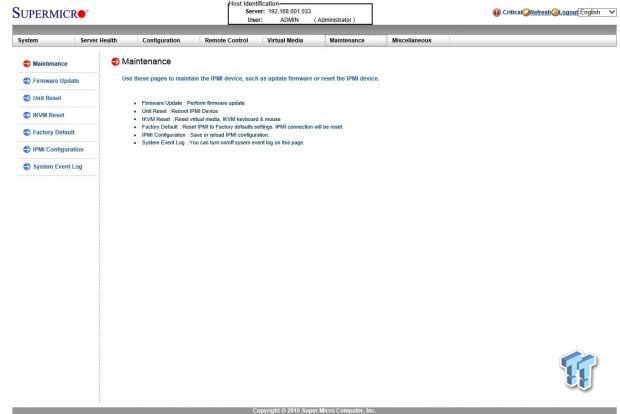
The Maintenance Tab allows you to update, reset and restore to factory defaults various systems on the IPMI device.
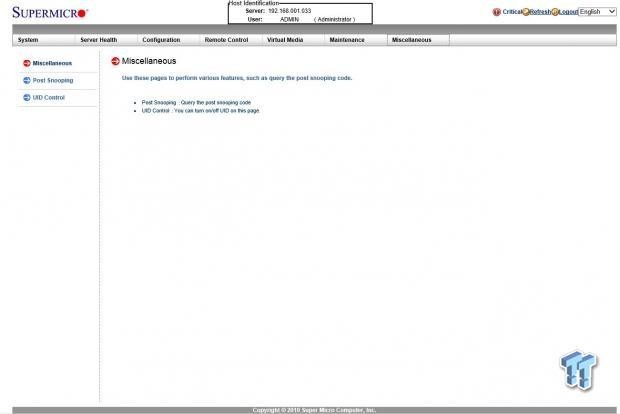
The Miscellaneous Tab has controls for Post Snooping and UID control.
Test System Setup
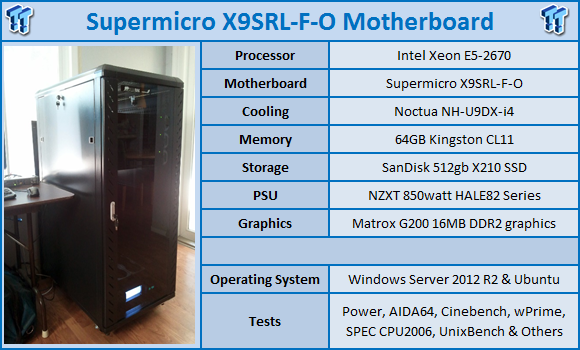
We would like to thank Supermicro, SPEC, Yokogawa, NZXT, SanDisk, Noctua and Kingston for their support in providing parts for our test system.
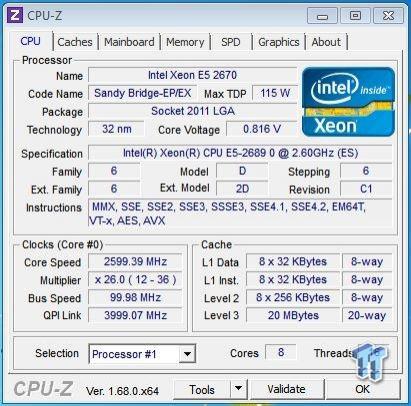
We have used this same CPU in most of our tests here in the lab, but usually two of them. This will be our first single socket 2011 system. These CPU's have proven to be real workhorses over time and generally good for multi-purpose systems.
In our tests, we will show this CPU vs other systems we have tested that are also single socket systems. These are with different sockets and will show by going to a CPU with 8 cores versus the other 4 core system, and what kind of performance gains you could expect.
System and CPU Benchmarks
Cinebench 11.5
CINEBENCH is a real-world cross platform test suite that evaluates your computer's performance capabilities. The test scenario uses all of your system's processing power to render a photorealistic 3D scene. This scene makes use of various different algorithms to stress all available processor cores. You can also run this test with a single core mode to give a single core rating.
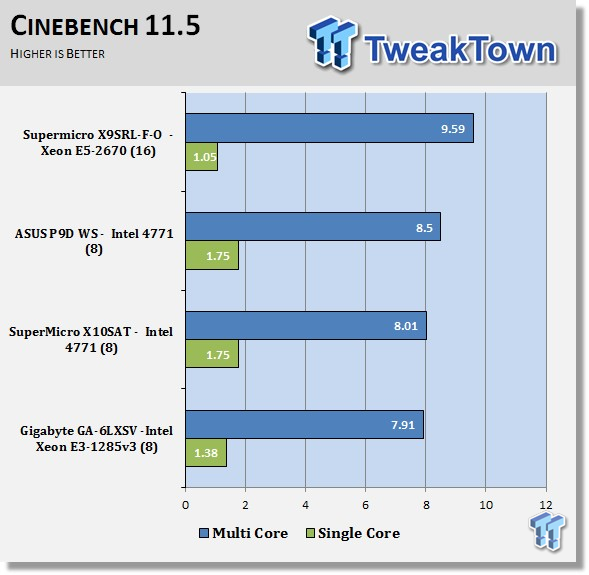
Here we get our first look at how these two different CPU's perform. The Xeon E5-2689 has a lower single core score because of its clock speed, but it really gets boost in multi-threaded scores. That is the main reason you would want to go to a higher core count in the first place.
Cinebench R15
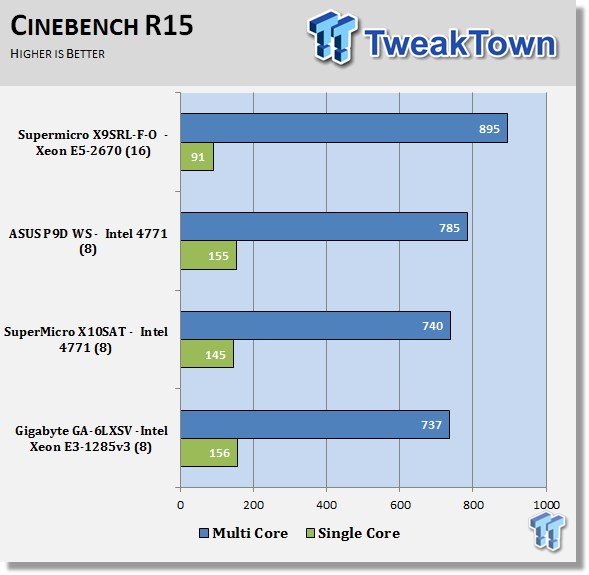
Just like in the Cinebench 11.5 results, the Xeon E5-2689 is lower in single thread score, but takes off in multi-threaded results.
wPrime
wPrime is a leading multi-threaded benchmark for x86 processors that tests your processor performance. This is a great test to use to rate the system speed; it also works as a stress test to see how well the systems cooling is performing.
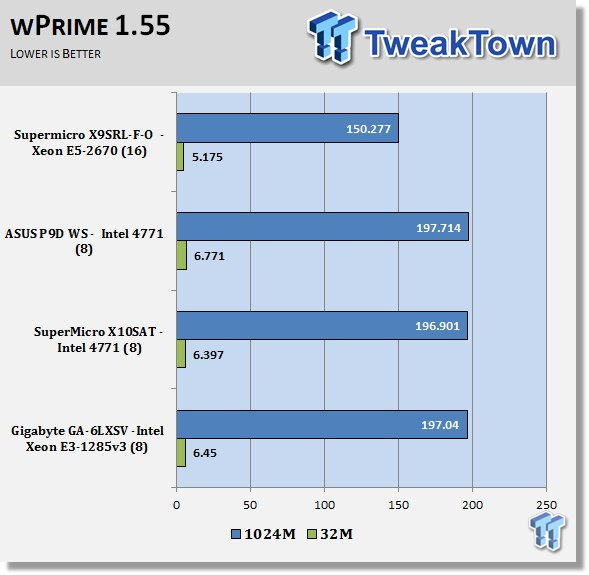
wPrime scores are not that impressive with the Xeon E5-2689. The clock speed is what is really holding this back.
Memory & UnixBench Benchmarks
AIDA64
AIDA64 memory bandwidth benchmarks (Memory Read, Memory Write, and Memory Copy) measure the maximum achievable memory data transfer bandwidth.
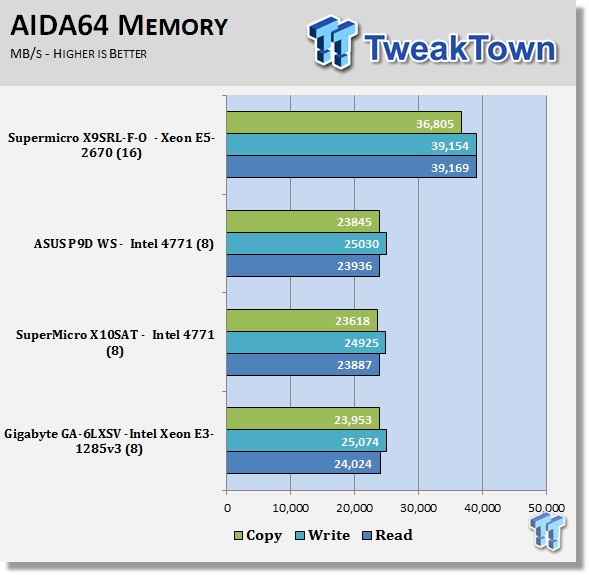
The socket 2011 platform has its advantages in memory bandwidth and speed with its quad channel memory setup. Here you can see that this platform is pushing memory by almost double compared to the others.
LinX
LinX 0.6.4 is a CPU benchmark that measures floating-point operations per second and is used to compare CPU performance; it is also a very good stress test to run.
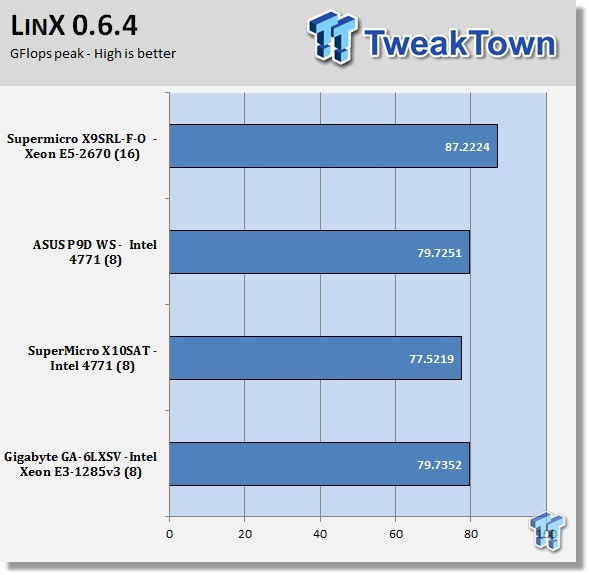
LinX shows again that the socket 2011 platform with quad channel memory is pushing memory much faster.
UnixBench 5.1.3
UnixBench has been around for a long time now and is a good general-purpose benchmark to test on Linux-based systems. This is a system benchmark and shows the performance of single-threaded and multi-threaded tasks.
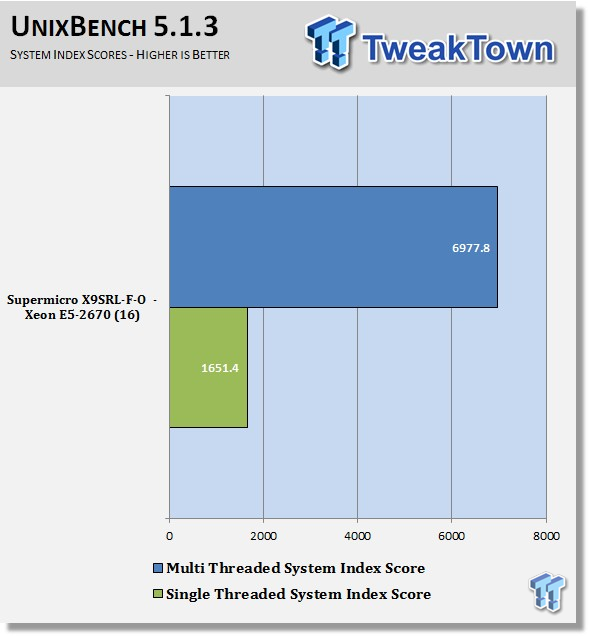
In the past, we were not using UnixBench, so we have no scores to compare. But the numbers shown are respectable for this class of CPU.
SPEC CPU2006v1.2 Benchmark
SPEC CPU2006 v1.2
SPEC CPU2006v1.2 measures compute intensive performance across the system using realistic benchmarks to rate real performance.
In our testing with SPEC CPU2006 we use the basic commands to run these tests.
Runspec --tune=base --config=tweaktown.cfg then int or fp
To do multi-threaded we add in --rate=16.
When SPEC CPU first came out these tests could take up to a week to run, but as computers become faster, our tests can take up to four days for a full run now and even less on some systems.
The user can do many thing to effect the results of CPU2006 runs, such as compiler optimizations, add-ons like Smartheap and different commands used to start the tests.
Just like in UnixBench, we had not started using CPU2006 on the earlier platforms that we did reviews on so we have no data to compare to.
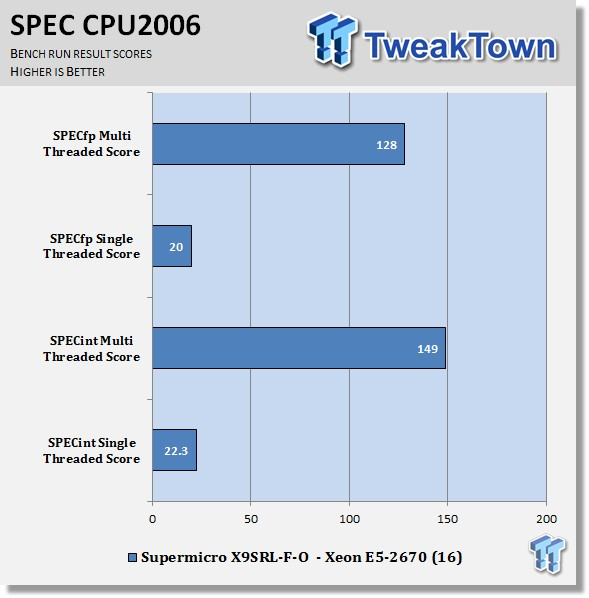
This benchmark has many different commands to use depending on what the user is looking for. For our tests, we used basic commands that run a full test with a base tune.
You can see here the SPEC scores after full runs for Integer (int) and Floating Point (fp) tests.
Single-core runs show how fast (speed) a CPU can perform a given task. In the multi-core runs, we set SPEC CPU2006v1.2 to use all thread to measure the throughput of the system.
The additional cores/threads of this system has a huge impact on performance in these tests and really shows the amount of horsepower that a dual-socket system has over a single-socket board
Single-threaded results are still very important, but when you need many single threaded apps to run, moving to a CPU with more cores is the way to go. Just like in the other tests, we see a similar pattern; Xeon E5-2689 shows better scores in multi-threaded runs.
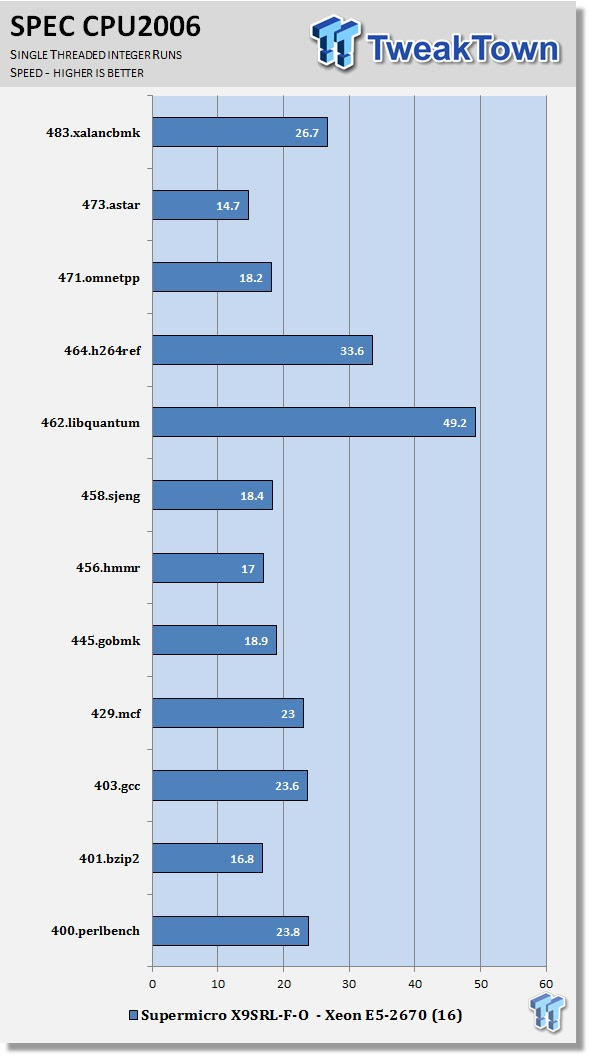
Looking at the results of single-threaded integer runs, we can get an idea of speed at which the Xeon E5-2689 can crunch through the different integer tests. Not all CPUs are equal here, and ones that have a higher speed will perform these tests faster. Naturally, using an overclocked system or CPUs with a higher stock speed, will generate higher results.
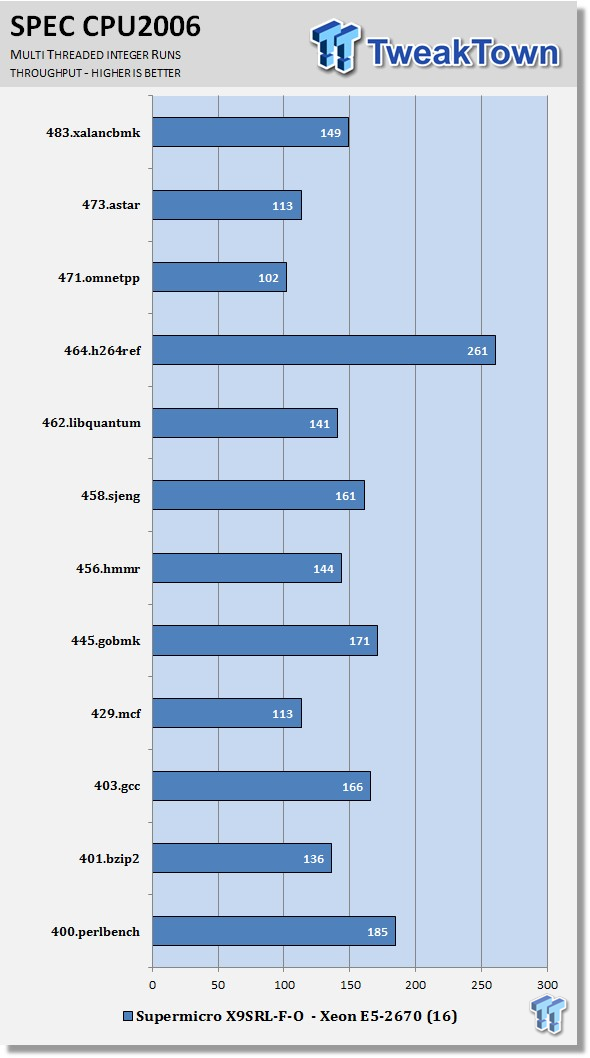
Now we run the test using all 16 threads on the Xeon E5-2689 and then all 64 cores to measure the throughput of the system. In this test, more cores/threads will have a greater effect on the outcome.
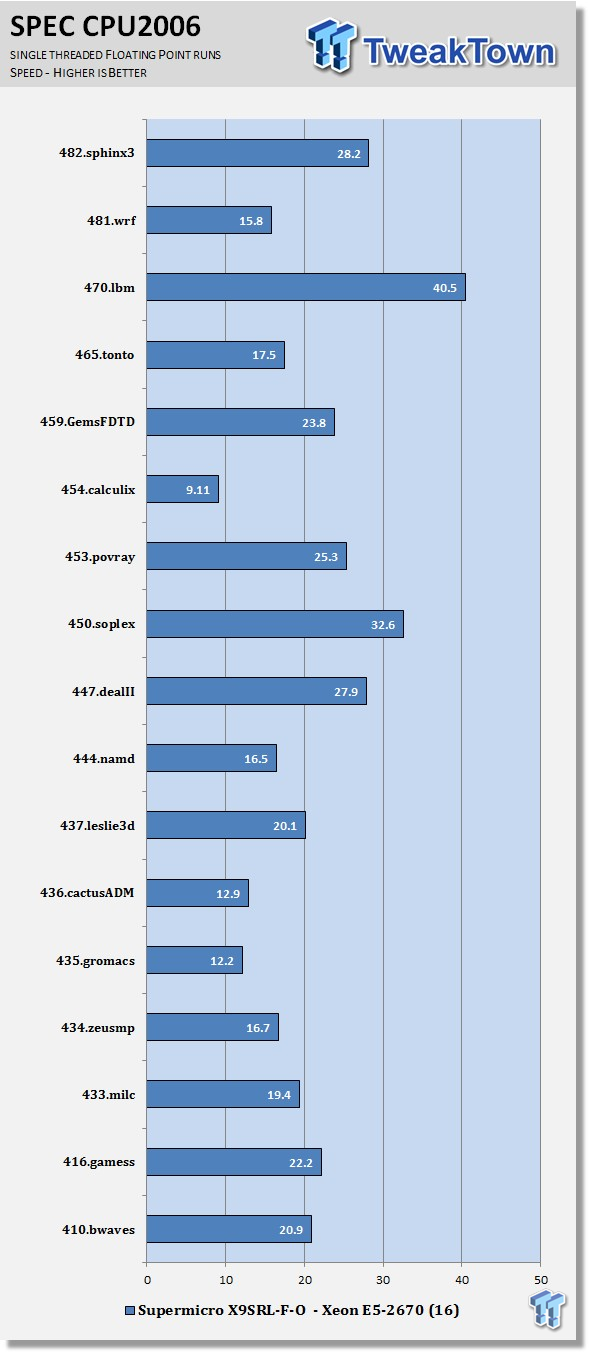
Just like the integer tests, we now run the floating-point tests in single threaded (speed) mode.
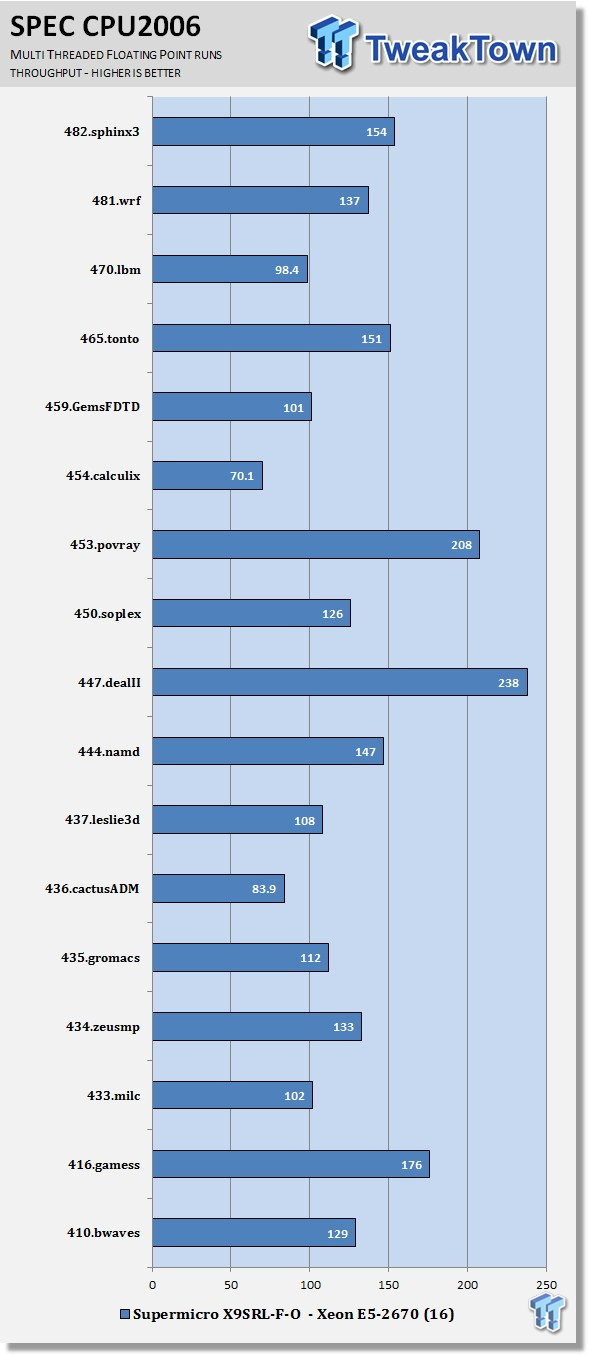
Here we see the results of the multi-core floating-point run that uses all 16 threads on the Xeon E5-2689. Like the multi-threaded integer test, more cores/threads will have a greater impact on the test.
Power Consumption & Final Thoughts
Power Consumption
We have upgraded our power testing equipment and now use a Yokogawa WT310 power meter for testing. The Yokogawa WT310 feeds its data through a USB cable to another machine where we can capture the test results.
To test total system power use, we used AIDA64 Stability test to load the CPU, and then recorded the results. We also now add in the power use for a server from off state to hitting the power button to turn it on and take it all the way to the desktop. This gives us data on power consumption during the boot up process.
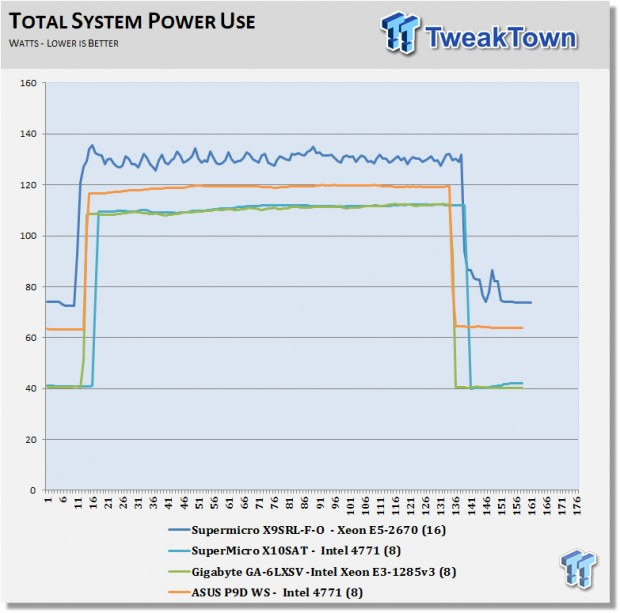
Here we can see that the system with Xeon E5-2689 uses a little more power. Power use jumps right up when we start the tests to a peak of about 135 watts. In some of our SPEC CPU2006 tests, we did see peak power use in the range of 180 watts.
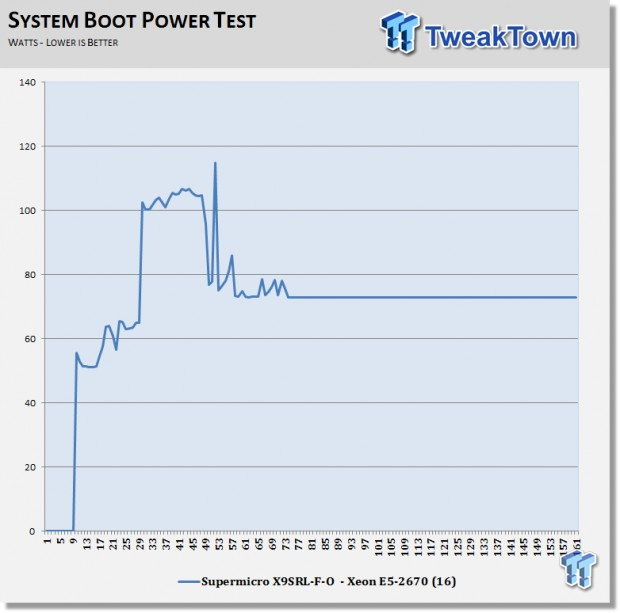
The X9SRL-F-O with a Xeon E5-2689 uses about 1 watt when turned off to keep IPMI active. After hitting the power button, power jumps to about 60 watts and then a peak of about 120 watts. After a brief run up of the server and booting the OS, the X9SRL-F-O motherboard will settle down to the 72 watt range.
This is useful to know when powering up a rack of these servers what the boot up power demands would be like.
Final Thoughts
The Supermicro X9SRL-F-O motherboard fits into the embedded appliance market very well, offering higher bandwidth and lower power consumption. It offers a large number of PCIe slots for many possibilities in expansion cards to fill many different roles.
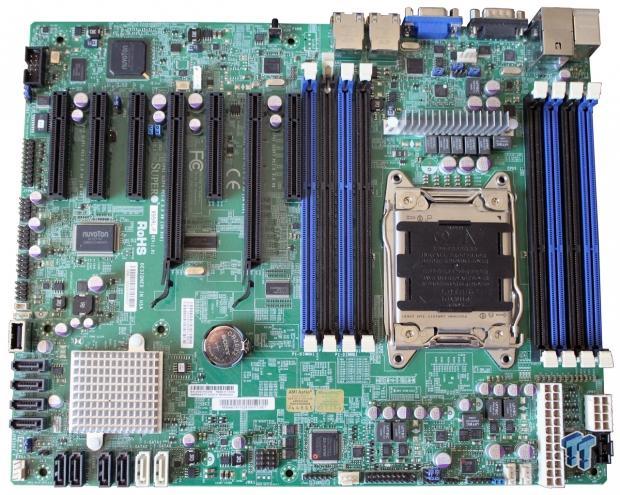
For a UP motherboard, the X9SRL-F-O also has an impressive load out of storage options, giving this board lasting value right out of the box.
It is also a perfect fit for cost optimized servers, I/O and networking expansion, communication, storage, medical equipment, kiosk and a variety of mainstream embedded server applications. We were impressed with the X9SRL-F-O with its ease of setup and configuration and the single socket 2011 enables the X9SRL-F-O to use powerful CPU's if needed for your application. The small form factor of the motherboard also allows it to be used in smaller cases to conserve rack space.
This general-purpose motherboard is hard to beat in performance, and then factor in power savings and ease of use, it is a winning combination, and it should have a long life cycle.
PRICING: You can find the Supermicro X9SRL-F-O for sale below. The prices listed are valid at the time of writing but can change at any time. Click the link to see the very latest pricing for the best deal.
United States: The Supermicro X9SRL-F-O retails for $271.49 at Amazon.
Canada: The Supermicro X9SRL-F-O retails for CDN$345.14 at Amazon Canada.

